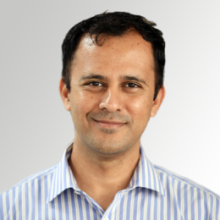Join the Department of Economics for a seminar presented by Dr. Ramanan Laxminarayan (UW MPH ‘99, PhD Economics ‘99) on Wednesday, May 24 at 3:00 PM in Savery Hall 130. Space is limited, so please RSVP with this form. See the details of Dr. Laxminarayan’s presentation, “On The Value of Disease Surveillance,” below:
Abstract: Disease surveillance enables early detection and response to emerging infectious disease threats but the value of surveillance depends on the ability to respond to emerging information. This talk covers both the economic value of information and incentives to respond to new information about disease outbreaks. A government's decision on whether to report an outbreak can be modeled as a signaling game in which a country has private but imperfect evidence of the outbreak. An important conclusion from such modeling is that not all sanctions necessarily discourage reporting. Sanctions based on fears of an undetected outbreak (false negatives) encourage disclosure by reducing the relative cost of sanctions that follow a reported outbreak. Moreover, improving the quality of detection technology may not promote the disclosure of an outbreak because the income lost by reporting truthfully is that much greater. Finally, informal surveillance is an important channel for publicizing outbreaks and functions as an independent yet imperfect signal that is less likely to discourage disclosure. In sum, obtaining accurate information about potential epidemics is as much about reporting incentives as it is about detection technology.
Dr. Laxminarayan is the Founder and President of the One Health Trust, founded as the Center for Disease Dynamics, Economics & Policy (CDDEP). He is a senior research scholar at Princeton University. He is an affiliate professor at the University of Washington, senior associate at the Johns Hopkins Bloomberg School of Public Health, and a visiting professor at the University of Strathclyde in Scotland. Dr. Laxminarayan chairs the board of GARD-P, a global product development partnership created by the World Health Organization, that aims to develop and deliver new treatments for bacterial infections. He is founder and board chair at HealthCubed, which works to improve access to healthcare and diagnostics worldwide.
Since 1995, Dr. Laxminarayan has worked to improve the understanding of antibiotic resistance as a problem of managing a shared global resource. His work encompasses extensive peer-reviewed research, public outreach, and direct engagement across Asia and Africa through the Global Antibiotic Resistance Partnership. Through his prolific research, active public outreach (including a TED talk that has been viewed over a million times), and sustained policy engagement, he has played a central role in bringing the issue of drug resistance to the attention of leaders and policymakers worldwide and to the United Nations General Assembly in September 2016.
